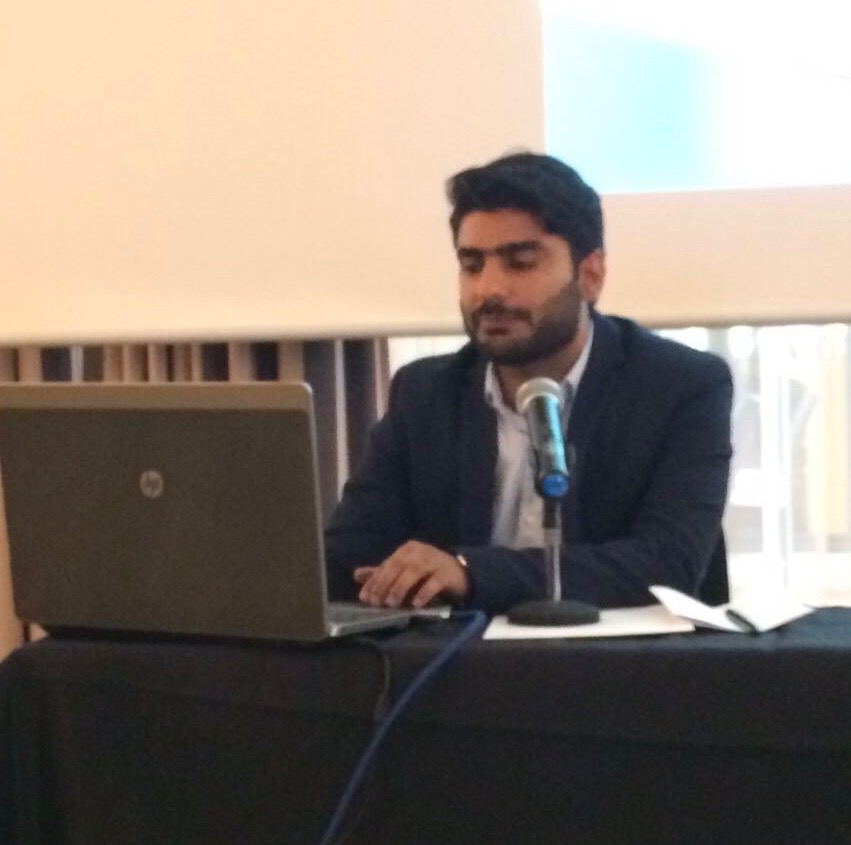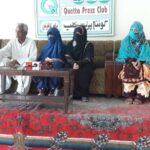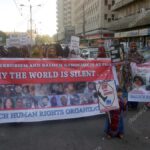Baloch Human Rights Organization’s General Secretary, Abdullah Abbas present a presentation on human rights violations in Balochistan in an event, organized by Baloch Republican Student Organization in Berlin, Germany on August 26, 2017. Abdullah Abbas shared his views about deteriorating condition of education, child mortality and maternal mortality rates due to lack of health facilities and serious human rights situation during military operations.
Balochistan, despite of being rich in mineral resources, 80 % of its citizens are living under poverty line, he added.

Majority of the areas don’t have basic facilities of clean water, health and employment. According to many reports, maternal mortality rate in Balochistan is 785out of 100, 000. Other than this, 158 out of 1000 children in Balochistan die due to malnutrition.
Abdullah Abbas expressed his concern on deteriorating education condition and said that it is government’s
responsibility to provide education to its citizen and is one of their basic rights but 70% of students in Balochistan are out of school. There are 5000 schools in Balochistan which only exists in official records. 80% of government schools which do exists don’t have clean water and other basic facilities. Moreover, the active professors and experts related to education are being killed through target killing. Many educationist including Saba Dashtiyari and Zahid Askani were killed who were running educational campaigns.
Abdullah Abbas said that people of Balochistan are going through stressful situation. Despite of presence of all these problems, military operations of security forces have worsened human rights situation. According to political parties and human rights organizations, 20,000 people are forcefully disappeared. Zakir Majeed, Zahid Baloch, Shabir Baloch and people from all walks of life are among the enforced disappeared people. Political parties of Balochistan an emphasizing that if any of these enforced disappeared persons has committed any crime, he should be trailed and be punished as per state constitution and law but the government and state forces, instead of implementing law, mutilated bodies of enforced disappeared people are being recovered. Since 2009, thousands of mutilated bodies of political activist are recovered. According to statistics more than 3000 mutilated bodies were dumped in Balochistan since 2009. It includes mutilated bodies of under age students to elderly people, which were recovered from isolated and deserted areas of Balochistan.
be punished as per state constitution and law but the government and state forces, instead of implementing law, mutilated bodies of enforced disappeared people are being recovered. Since 2009, thousands of mutilated bodies of political activist are recovered. According to statistics more than 3000 mutilated bodies were dumped in Balochistan since 2009. It includes mutilated bodies of under age students to elderly people, which were recovered from isolated and deserted areas of Balochistan.
In 2014, a mass grave was discovered from Tootak, district Khuzdar. The forces surrounded the site the next day and sealed the place. No one is allowed to visit the site. On the first day 13 corpses were found buried in the grave. 2 corpses were identified from their identity cards, placed in their pockets. Both of them were abducted by security forces and intelligence agencies from district Awaran. Other than this, mass graves were also discovered from Panjgur and Dera Bugti. 8 corpses were recovered from both of the graves. According to locals, they were abducted by security forces in front of many eye witnesses.
Abdullah Abbas further added that the ongoing military operations and incidents could not make its place in local media and if any journalist or human rights activist tries to raise voice against this situation, he will be targeted. Hamid Mir, a well-known journalist and anchor person was shot multiple bullets for raising these issues, but luckily  he survived. Sabeen Mehmud, a human rights activist was silenced for ever after organizing a panel discussion program on enforced disappearances in Balochistan.
he survived. Sabeen Mehmud, a human rights activist was silenced for ever after organizing a panel discussion program on enforced disappearances in Balochistan.
Abdullah Abbas said that national and international human rights organizations should play their role in order to save civilians of Balochistan from this situation.


